The crisis in Iraq, where Sunni Islamist militants have overrun northern cities, has revived memories of the American-led war 11 years ago. President Barack Obama, who pulled American troops out Iraq three years ago, is threatening military action.
Some of the war’s planners and supporters, including those whose prewar assertions were discredited, have emerged to offer advice. Here’s a look at where some of the memorable figures from the Iraq war are today.
Sign up for breaking news alerts from NBC News
The Americans
George W. Bush
The 43rd president pledged in March 2003 to rid Iraq of weapons of mass destruction and stop it from helping terrorists. “Before the day of horror can come, before it is too late to act, this danger will be removed,” he said.
Bush, living outside Dallas since he left office in 2009, has yet to comment on the most recent Iraq crisis. He has generally refrained from second-guessing his successor on both matters foreign and domestic.
Dick Cheney
The former vice president has taken exactly the opposite approach: This week he published an Op-Ed and a YouTube video accusing Obama of putting the United States “on a path of decline.” He wrote “rarely has a U.S. president been so wrong about so much at the expense of so many.”
Cheney told NBC's “Meet the Press” on the eve of the Iraq war in 2003 that American forces “will, in fact, be greeted as liberators.” He said in 2005, six years before the United States left Iraq, that the insurgency was “in its last throes.”
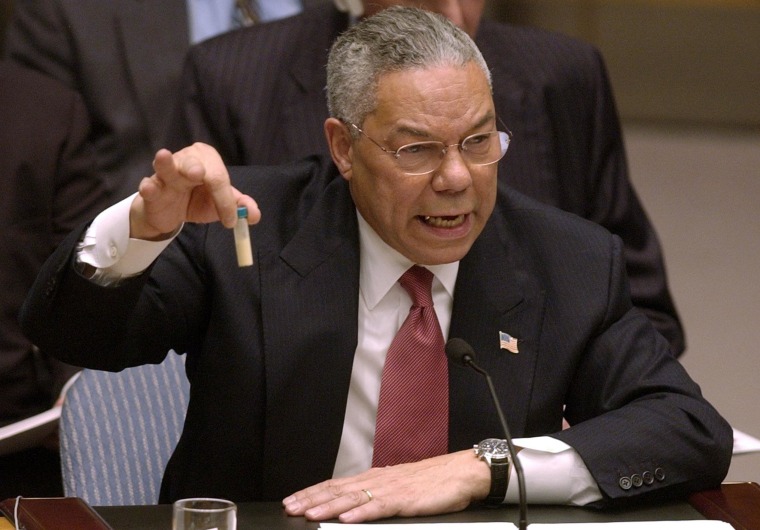
Colin Powell
As secretary of state, Powell appeared before the United Nations in March 2003 to build international support for the war. In an indelible image of the time, he held up a model vial of anthrax.
In an appearance this week with the Prime Minister of Japan, Powell expressed hope that “some solution can be found” to the violence so that “diplomatic procedures can start to be used to solve this problem,” according to the Japan Times.
Donald Rumsfeld
Asked in February 2002 whether there was evidence that Iraq was supplying weapons of mass destruction to terrorists, the defense secretary spun a riddle about “known knowns,” “known unknowns” and “unknown unknowns.”
He has not commented publicly on the new violence in Iraq. Filmmaker Errol Morris asked him for a documentary earlier this year whether invading Iraq was a mistake. “I guess time will tell,” Rumsfeld said.
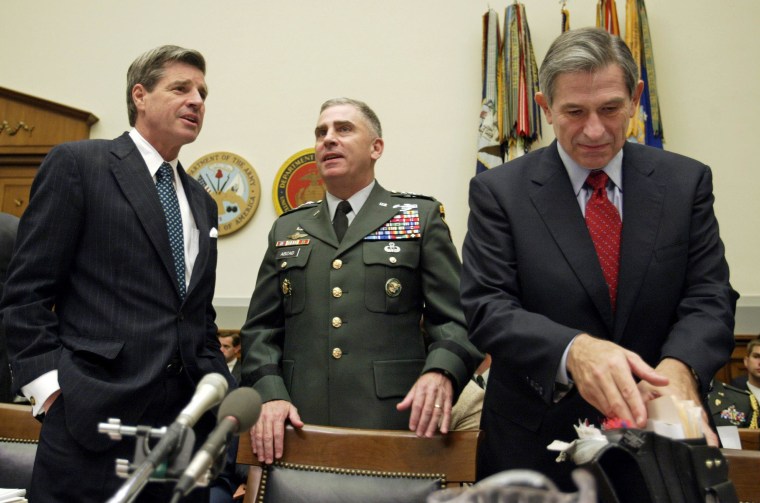
Paul Bremer
The top U.S. civilian administrator in Iraq during the early days of the war said this week that Obama should not have ruled out putting troops on the ground. He said the militants pose a threat to the United States and the Middle East, he said.
“I’m not in favor of sending combat forces into Iraq at the moment,” he said on MSNBC’s “Morning Joe.” “But I can well imagine that we would have to have some troops on the ground.”
Bremer has since published two books, including a memoir in 2006, “My Year In Iraq: The Struggle to Build a Future of Hope.” He also paints, primarily landscapes of Vermont and Washington, D.C., and sells them on his website.
Paul Wolfowitz
As deputy defense secretary, Wolfowitz was an architect of the war. He told Congress that Iraqi oil revenue would generate up to $100 billion in three years and suggested it would take fewer troops to keep the peace than to conduct the war.
Wolfowitz went on to become president of the World Bank. On “Meet the Press” last Sunday, Wolfowitz said Iraq was more than an “obscure Shia-Sunni conflict.” He said al Qaeda was “on the march.” The al Qaeda branch that spawned ISIS was disowned earlier this year by traditional al Qaeda.
Condoleezza Rice
As national security adviser, Rice was asked on CNN in September 2002 whether Saddam Hussein was close to developing a nuclear weapon. She said there was some uncertainty, but added: “We don’t want the smoking gun to be a mushroom cloud,” he said.
Rice now teaches political economy at Stanford University. She was heckled Thursday during a speech at a college in Vermont. She told the crowd there that ISIS must not be allowed to control “a swath of land the size of Indiana.”
To the hecklers she said: “Democracy is great. Sometimes it’s noisy.”
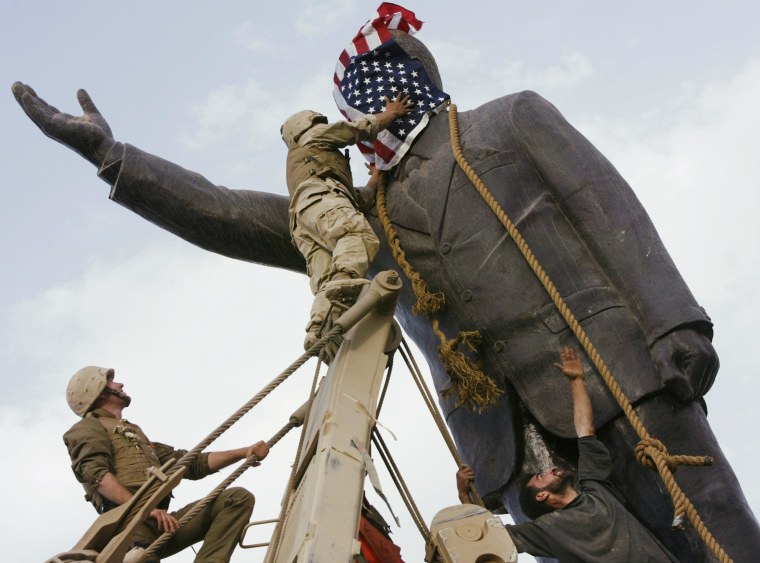
Edward Chin
The Marine created one of the enduring images of the war when, in April 2003, he draped an American flag over the face on a statue of Saddam Hussein. Then he draped a rope around the neck that was used to tear the statue down.
He returned home to New York, went to back to school and became an architect. He now has doubts about the war.
“What did we go there for?” he said in an interview with the New York Daily News last year. “What do these people want? I feel they really don’t know what they want. They didn’t want Saddam in power. But they don’t seem to want democracy either.”
Pfc. Jessica Lynch
She emerged as one of the first heroes of the war when American special forces rescued her from an Iraqi hospital after her convoy was attacked in Nasiriyah. She was 19.
She told Congress in 2007 that the story of her rescue — an account that had her going down shooting, a “little girl Rambo” — was not true. She said her weapon jammed in the ambush and she never got off a shot.
Lynch got married and had a daughter, now 7. In 2011, she got a degree in elementary education to pursue her dream of becoming a teacher. She told Fox News in 2012 that she still walks with a brace and has severe nerve damage.
The Inspectors
Hans Blix
The United Nations weapons instructor reported in early 2003 that Iraq probably didn’t have weapons of mass destruction.
He later published a book and accused the U.S. government of dramatizing the threat. He now gives lectures and occasionally writes on the crisis over the Iranian nuclear program. Last fall, he credited the Obama administration for striking a deal with Iran to curb the program.
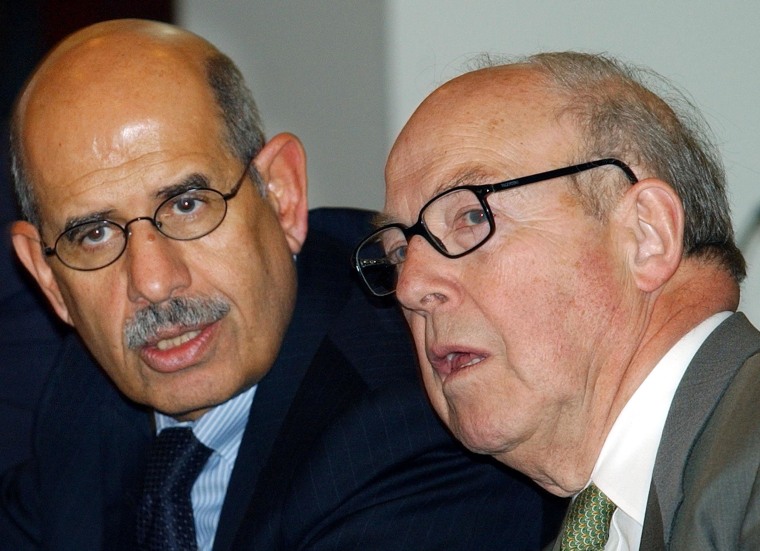
Mohamed ElBaradei
The former head of the U.N. nuclear agency said on the eve of the American invasion that there was “no evidence or plausible indication” that Iraq had a nuclear weapons program.
He and his agency accepted the Nobel Peace Prize in 2005. He protested the regime of Egyptian President Hosni Mubarak during the Arab Spring in 2011 and was rumored to be a presidential candidate himself, but he declined to run.
The Iraqis
Saddam Hussein
The Baathist strongman who ruled Iraq for 24 years and survived the first Gulf War was captured by American forces in 2003. He was convicted three years later in the killings of 148 Shiites in the 1980s by an Iraqi tribunal. He was hanged before dawn on Dec. 30, 2006.
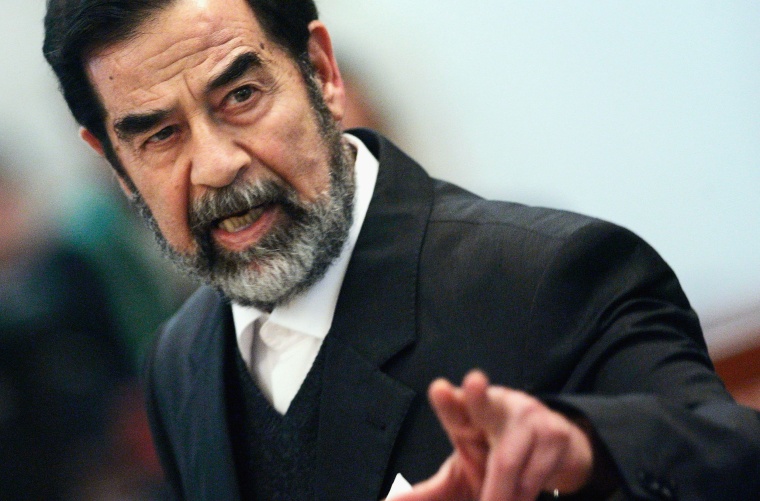
Uday and Qusay Hussein
Saddam’s sons were killed in a three-hour firefight with American forces in Mosul in July 2003. Both were believed to have found fabulous wealth through oil smuggling, and to be potential successors to their father.
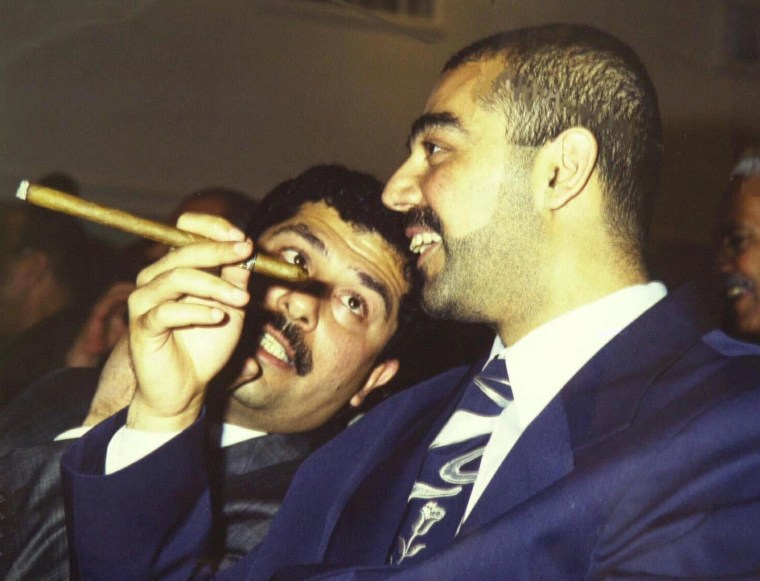
Ali Hassan al-Majid (“Chemical Ali”)
He held positions throughout the Iraqi government, was credited with a 1988 chemical attack that killed up to 100,000 Kurds in Iraq.
After being sentenced to death — four times — for his roles in mass killings and the assassination of a grand ayatollah, he was hanged in January 2010.
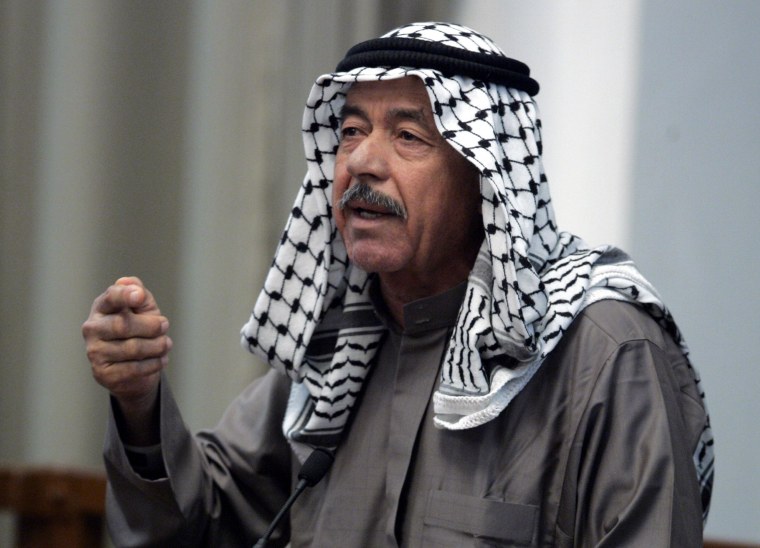
Mohammed Saeed al-Sahaf (“Baghdad Bob”)
Sometimes also called "Comical Ali," he was the chief spokesman for the Iraqi government during the invasion, and gained fame for insulting, outlandish statements trumpeting the Iraqi military and the impending doom of the Americans. “We will slaughter them all,” he once said. And, more creatively: “We will welcome them with bullets and shoes.”
Al-Sahaf was never charged for his role in the Hussein government. For a time after the invasion he was a pundit on an Arab news channel, but his whereabouts today are unknown.
Ahmed Chalabi
The exiled Iraqi politician was blamed for stoking the war by persuading American media outlets that Hussein had weapons of mass destruction. He has returned to Iraq and escaped both legal trouble and attempts on his life. He has been mentioned as a possible successor to Nouri al-Maliki, the troubled present-day Iraqi prime minister.